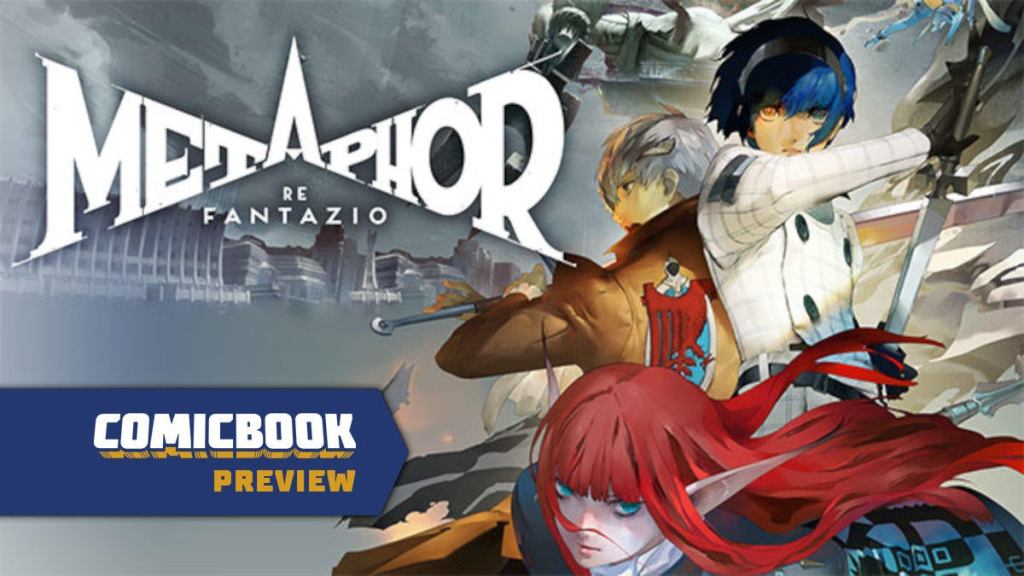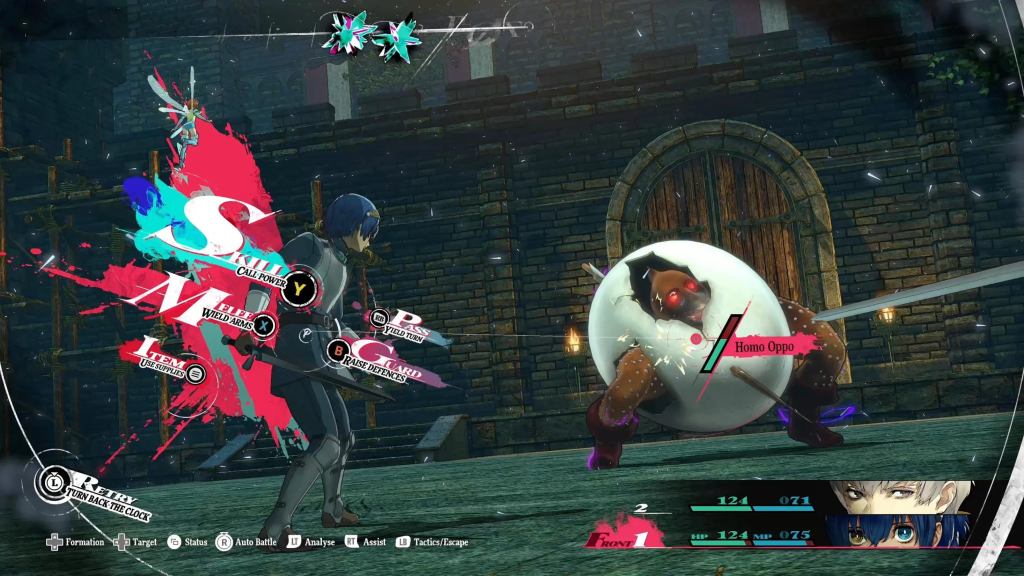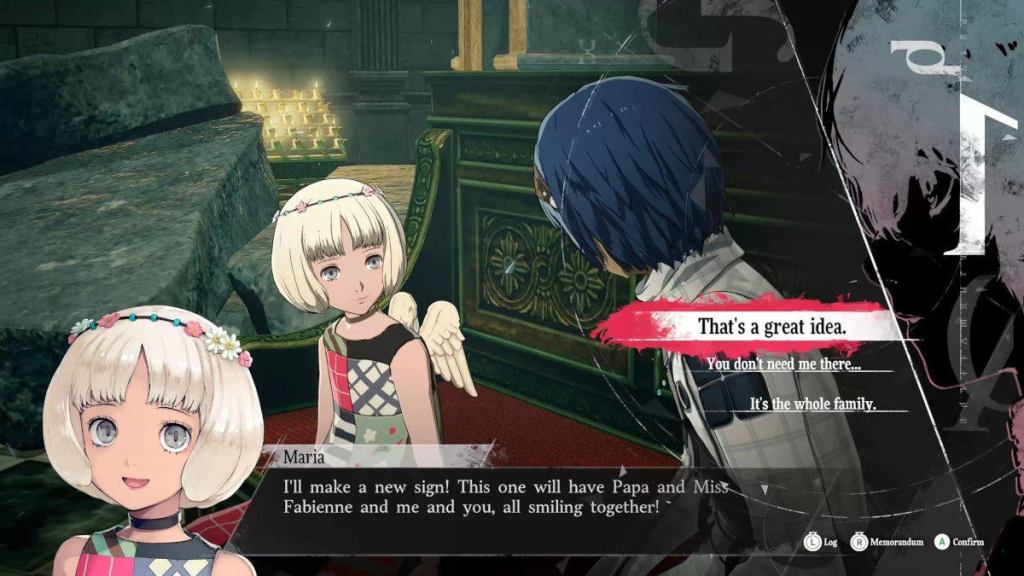Ever since Atlus revealed , the upcoming roleplaying game from Studio Zero, the team comprised of the creative Persona series director Katsura Hashino, character designer Shigenori Soejima, and composer Shoji Meguro, the game, previously known by the working title Project Re:Fantasy, has been looked at by fans as “fantasy Persona.” At first glance, it’s an understandable comparison. The early footage of bore many of the signature visual styling of the Persona franchise, including bold design choices in the user interface. However, it only takes a few hours with Metaphor: ReFantazio to discover that such an elevator pitch description is unfairly reductive. I got those few hours with Metaphor: ReFantazio during a special preview event hosted by Atlus and Sega (the game’s publisher in North America) in August. Here’s my accounting of the experience.
Videos by ComicBook.com
Metaphor: ReFantazio begins with the death of a king who dreamed of utopia. Metaphor: ReFantazio‘s is set in the kingdom of Euchronia, a world comprised of various tribes (think of the races in a Dungeons & Dragon handbook) with differing physical appearances and relationships to magic. Some wield more power in society than others. This now-dead king and his son, a prince believed to be dead but actually in a magical coma, believed the tribes could be united. Some suspect their (apparent) deaths to have been orchestrated by those who do not share their vision for the future of the realm.

Metaphor: ReFantazio‘s First Hours
Players control a character from the Elda tribe, considered “tainted” by the dominant religion of Euchornia due to the magic that comes naturally to their kind. The main character is the prince’s childhood friend who goes to the capital with his fairy companion Gallica on a secret mission but is soon set on a new course when an election breaks out.
Players first control the main character after his caravan is waylaid on the road to the capital. Players must cross the monster-infested landscape between them and the city gates. The game warns players to avoid monsters, which I foolishly took as an invitation to test the game’s combat and died quickly. Eventually, I realized I was meant to dodge the beasts roaming the land, a surprisingly unempowering experience for a game of this type, keying into one of the game’s intended themes of anxiety.
Much like the early hours of a Persona game, much of Metaphor: ReFantazio‘s opening act is spent on cutscenes and dialogue setting up the game, its world, and what’s to come. As the main character works through the early steps of his plan, which involves enlisting in the army, players are introduced to concepts like igniters, which allow those without inherited magical abilities to wield such power, and the other tribes and power dynamics in Euchornia. Along the way, they make more allies, including the ruined noble Stohl. Soon, the main character and Strohl are exploring a tower under attack by a huge monstrous being called a “human.”
Using “human” to describe the game’s monsters (none of the game’s tribes are human) is a loaded one. It’s also one way that Metaphor: ReFantazio distances itself from the player, a key difference in its approach to immersion compared to the Persona games, which invite players to inhabit a silent protagonist and use them as a cipher for the self. Metaphor: ReFantazio separates the player from the main character, having the players name themselves and the game’s hero separately. That the hero speaks in Metaphor: ReFantazio makes him less of a player stand-in than any of Persona’s main characters, and the lack of romance options shifts the focus away from the intimate and personal. This is the cornerstone of some of Metaphor: ReFantazio‘s themes, which focus on the power of groups. The dynamics between the tribes are another aspect of that, as is the competition among candidates for king to garner support from the public.

Metaphor: ReFantazio Combat
The theme is reflected in Metaphor: ReFantazio‘s combat as well. In the Persona games, only the main character can use multiple personas and swap them during battles. In Metaphor: ReFantazio, every party member can swap between unlocked archetypes, which serve a similar purpose to persona but define a party member’s role in combat more fully, not unlike the job system of certain Final Fantasy games. Some archetypes fall along traditional fantasy adventure roles like Healer, Warrior, Mage, and Thief, while others are less conventional, such as Merchant or Faker. Crucially, archetypes cannot be changed during combat, but only in safe areas like cities. That means players can’t depend on their main character to cover all their bases in a pinch like they can in a Persona game. That makes party planning a crucial component of Metaphor: ReFantazio‘s gameplay, again casting the game’s focus on group dynamics.
There are elements in Metaphor: ReFantazio‘s combat that are borrowed from modern Shin Megami Tensei and Persona games. The key feature of Atlus RPG combat, the “Push Turn” system, returns, allowing players to gain extra actions by exploiting enemy weaknesses. In another nod to group themes, the party all draw from a shared pool of actions to spend, with attacks that exploit an enemy’s weakness only taking half as many resources as actions that don’t.
After completing the game’s opening hours and a short break, I got to experience gameplay deeper into the game. It was clear that we’d skipped over some pivotal story beats. Now, the main character was attempting to sway voters in his favor. I had a more-than-full party, which meant I had to choose which party members to include in my four-person squad and several new archetypes. I stuck with the four provided by default, all decked out with the classic tabletop RPG party composition of warrior, healer, mage, and thief. This was a mistake, but more on that in a minute.
Given the choice to pursue more of the main story or explore the city that my faction had made their base in search of a side quest to embark on, I chose the latter. I soon had an item of great sentimental value to the main character stolen from him and had to turn to a shady character who happened to be nearby for help. Said shady character wasn’t working for free though, and only would aid me if I first explored an abandoned tomb for an item he desired. I accepted the quest, hopped into my Gauntlet Runner (a Ghibli-esque vehicle that runs across the land, like a cross between the cat bus in My Neighbor Totoro and the wizard’s eponymous home from Howl’s Moving Castle), and was on my way.

Metaphor: ReFantazio Dungeon Crawling
Keeping track of and efficiently using a limited time frame is a crucial gameplay element in the Persona series that also makes its way into Metaphor: ReFantazio. Since Metaphor: ReFantazio isn’t confined to a single city or Tokyo neighborhood, traveling from one location to another consumes time, a couple of days in my journey’s case, and requires camping for rest at the end of each day. During these pauses, players can pursue relationship-building activities with their allies that will unlock new abilities for different archetypes. My journey was also interrupted by crossing paths with a Gauntlet Runner belonging to another candidate for kingship who shouted a political philosophy stating that the young should exist to subsidize and support the old like some twisted nightmare version of a social safety net (in a Q&A later in the day, the developers suggested this character has more nuance than was shown there as he represents a group of veterans of an almost forgotten war).
Having defeated my political rival in combat, as one does, my party arrived at the tomb for what turned out to be a dungeon delve very reminiscent of a traditional tabletop RPG experience, complete with undead enemies, hidden doors, secret passageways, and angry, sentient treasure chest monsters. This is one of, what attendees were told are, many sidequest dungeons spread throughout the game, each designed with intent rather than procedurally generated and featuring many different aesthetics, themes, and locales.
Also, that aggressive treasure chest monster? A few appear in the dungeon, including an oversized boss monster version. (I was disappointed to realize that, despite recognizing it as a trap, my characters had no recourse but to fight it if they wanted to complete the quest, but alas…) This creature tested my nascent familiarity with Metaphor: ReFantazio‘s systems to their limits. I was forced to consider every action and half-action to avoid a total party kill.
I emerged from the battle victorious and the tomb having completed my quest. I later learned I struggled with that boss partly because I’d stuck to the default party makeup. If I’d taken a little more time to explore the town and passed a few gold pieces to the local “informant” character, they’d have tipped me off that taking a Merchant archetype into the tomb might be a boon. As others playing the game discovered, a character using the Merchant archetype can toss coins at the treasure chest boss, distracting it and making it easier to defeat. Knowledge is power kids, particularly when planning an expedition into a monster-infested crypt.
Once I returned to the city, I turned in the quest. A cutscene followed in which the dodgy individual retrieved my blade, as promised, and suggested I needed to be more willing to play in the gray areas of the moral spectrum, resorting to spies and information networks if I wanted to become king. The scene rewarded me with a new bond giving me access to the Faker archetype, which specializes in duplicity. The scene felt like the moment in a political story where the idealist candidate makes their first major compromise, with potentially more to follow.
Metaphor: ReFantazio Is More Than Fantasy Persona
The Gauntlet Runner to Gauntlet Runner pre-battle shouting and the more subtle scene with the Faker bond was about as overtly political as my playthrough got. Hashino in a pre-taped video message, and the developers on hand for the Q&A both emphasized that, despite the election-year timing of the game’s release and the use of an election as a device, Metaphor: ReFantazio has no political agenda and instead focuses on that them of anxiety.. I question whether it’s possible to build an apolitical game (if such a thing exists) around such explicitly political trappings, and if the effort to hang societal conflict on personal, or even collective anxieties may ultimately be to the game’s detriment.
Despite that, my all-too-brief, fragmented time with Metaphor: ReFantazio left me eager for more. The signature Studio Zero visual flair and killer soundtrack by Persona favorite Shoji Meguro, coupled with the familiar gameplay rhythm of daily tasks and engaging turn-based combat, could easily have brought me to that near-meditative, rhythmic gaming state that this creative team has made their hallmark. Yet, to call Metaphor: ReFantazio a fantasy-themed Persona feels unfair. It seems clear that the team is playing with different ideas, both in gameplay and narrative themes, and there’s every reason to be excited by that prospect.
Metaphor: ReFantazio launches worldwide on October 11, 2024 for PlayStation 4, PlayStation 5, Windows, and Xbox Series X/S.








